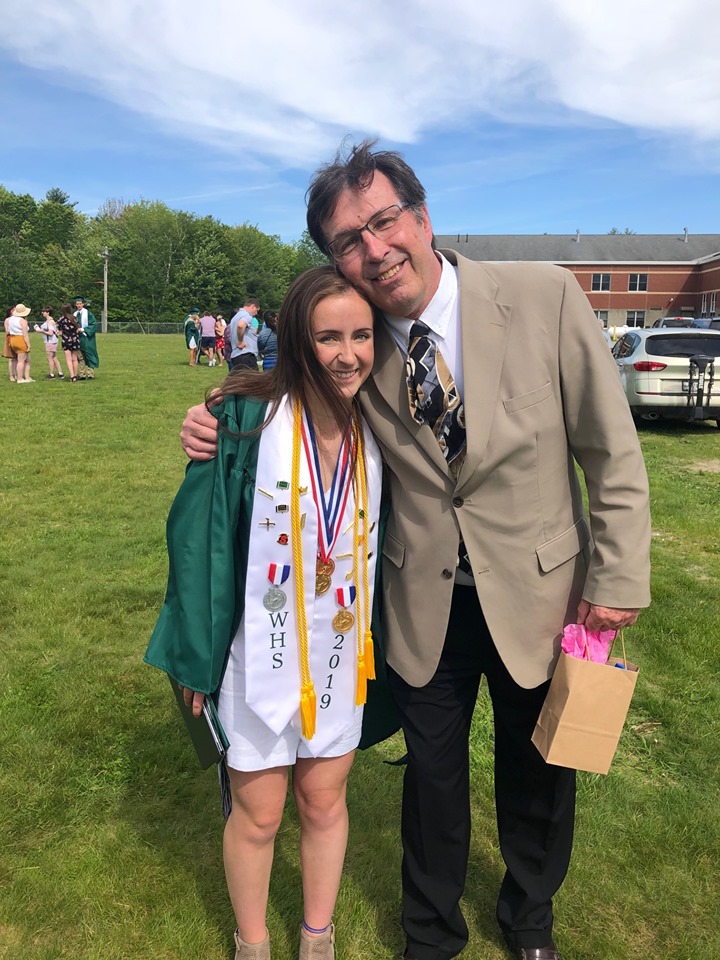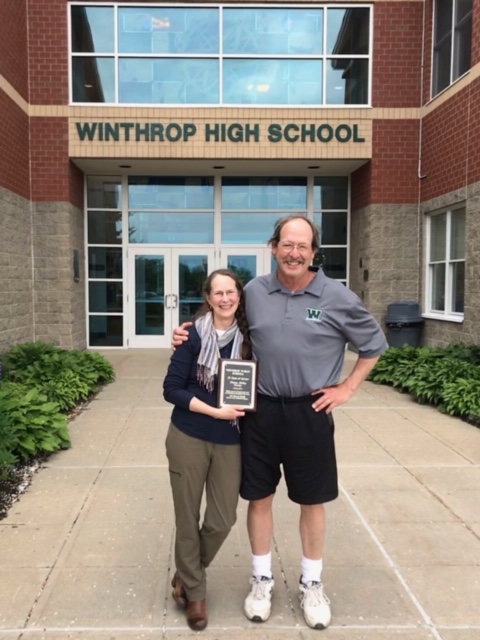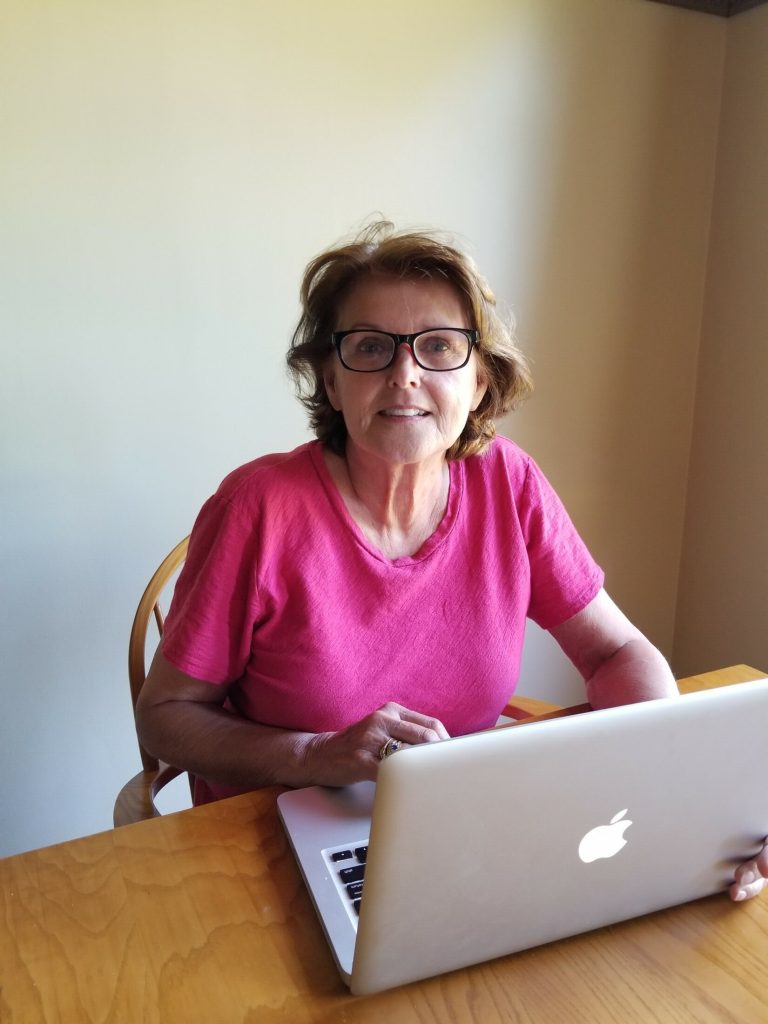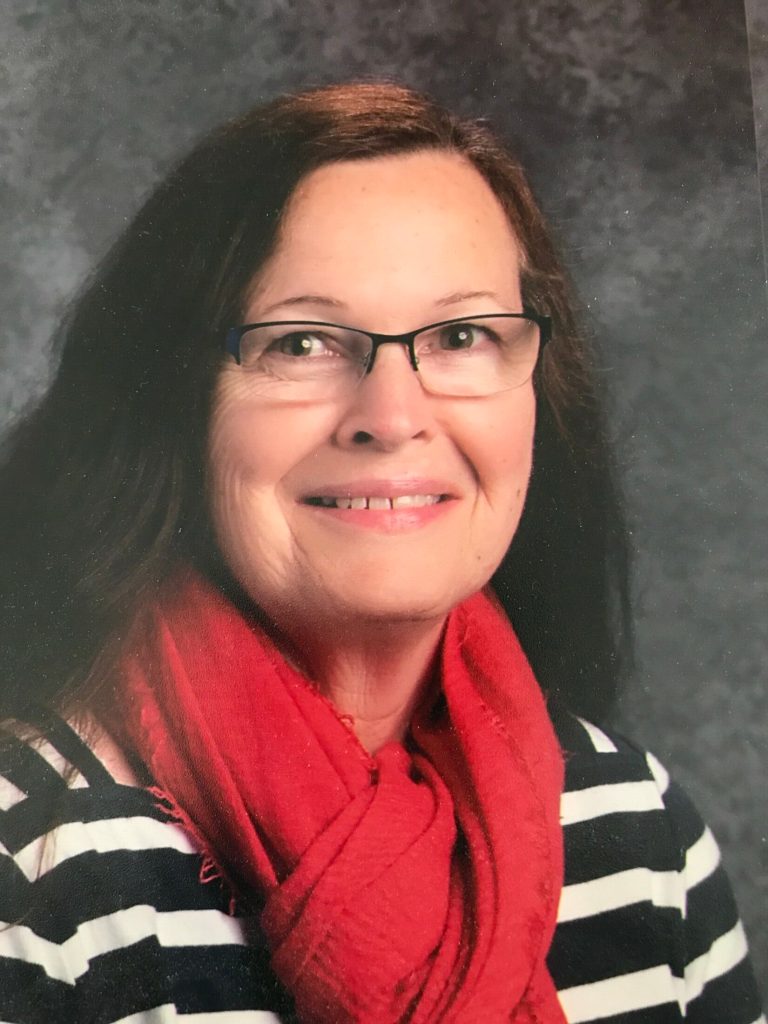WINTHROP — Winthrop High School will be missing four longtime teachers when school returns next fall.
Mary Dumais, Nancy Kelley, Dave Poulin and Beth Salois have retired, after a combined 150 years of teaching.
Poulin said the students haven’t changed during that time.
“The kids are great from when I started teaching to now,” he said. “They have always been very respectful and have maintained that respect.”
Recent graduate Nora Conrad had the opportunity to learn from Dumais, Kelley and Poulin. They developed her interest in social studies, and next year she will study at the University of New Hampshire with a majors in both homeland security and computer science.
“When we talked about Watergate and technological aspects of events over history (during Poulin’s Modern America Class),” Conrad said, “that made me want to study these subjects. It’s going to be noticeable without him there next year.”
A graduate of Winthrop, Poulin said he thought he was headed to Washington, D.C., for federal government work when the principal offered him a teaching position. He started immediately and quickly realized it was the career for him, spending 46 years teaching social studies at the high school.
Originally from Danvers, Massachusetts, Dumais was the first person in her family to attend college, going to the University of Maine. The institution was the right fit, as was Maine. A social studies teacher at Winthrop High for the last 19 of her 42 years in education, Dumais spent the prior 17 years teaching at Winthrop Middle School.
Kelley was at Winthrop High for 33 years, first teaching business and then French. After five years of working as an accountant, she took a chance on teaching — a career she had dreamed of pursuing but didn’t upon the recommendation of her mother, also a teacher, who said the market was over-saturated.
In 2002, when Kelley’s daughter took French, it renewed her interest in studying the language. And that led to a subject change. About nine years ago, when the previous language teacher left the school, Kelley started teaching some French classes, eventually making it her primary subject.
Salois spent her 29-year career teaching special education and life skills working with students with moderate to severe disabilities. She taught 23 years at Winthrop, with several of her other years at Monmouth Middle School. A practicum opportunity at a school that educated moderate to severely disabled students when she was in high school in Hudson, Massachusetts, led her down her career path.
Also retiring from Winthrop Public Schools this year is Janet Anderson, assistant principal of Winthrop Grade School, who declined to be interviewed about her experience.
Dumais stood out to Conrad because she went out of her way to help her students be successful.
“We’d have study sessions after class and school — even after dinner,” Conrad said, describing studying for Advanced Placement tests, which give students credit in college courses.
And Kelley, Conrad said, connected to and cared about her students.
“She’d ask how you were doing or what was going on, and she really cared about your answers,” she said.
Poulin taught not just the subject but life lessons like morality, Conrad said.
“He’s really good about understanding that, when you’re teaching, it’s not just about teaching the topic but about teaching life lessons and making an impact on lives,” she said.
QUESTION AND ANSWER
Reflecting on their years in education, all four educators described their experience and offered advice for new teachers.
What has been the most memorable about teaching?
Dumais: Since it’s a small town, and I raised two sons who went to school here, most of these kids have been together since they were in kindergarten. That community feel has been a good thing. Kids know you from another aspect of your life other than just the person behind the teacher’s desk. Going to plays and concerts and sporting events helps with bonding.
And I’ve been here for so long now that I’ve started to see kids of students I had taught — that’s interesting and positive.
Kelley: When I see an adult in the grocery store who was a student of mine and they tell me how important I was to them. Or I have their child as a student, and they’re excited that they’ve connected.
As part of the advisee program at the high school, we go out with kids. You see kids outside of the classroom, and that’s really fun. They don’t have the worries of a test or having not done their homework.
Poulin: Every time a kids get it. Every time a kid understands and becomes interested and excited. This year, a student came up to me and said, “I’m not as excited as you, but I’m getting there.” Those are things that make it worthwhile.
It’s tough to pick out one moment. Every day has just been great. Winthrop is a special place. Caring people are behind one another here.
Salois: With special ed, there are so many different things going on in your classroom, so many needs that you’re meeting that are all very exciting.
One of the things I’m impressed with is how accepting the community is with people with special needs. My class does a lot of community activities. Until you generalize a skill, you haven’t really learned it.
People in Winthrop have been very acceptable. They show us they’re learning from us as we’re learning from them.
How has being a teacher changed during your career?
Dumais: More and more mandates are put in place and more top down decisions made about what should or shouldn’t take place in the classroom. It wasn’t like that in the beginning.
Kids are kids. Things that the kids face over time have stayed the same, and some have gotten more complicated. More recently, I see more kids with less than two-parent families.
Technology has changed — and that has good sides and bad sides. Having access to lots of valuable information at their fingertips is wonderful but can sometimes become a distraction, and their focus isn’t necessarily there because they have computers in their pockets. They can be waylaid somewhere else.
Kelley: The students are the same. I loved being with students my entire career. Being with all these young people — it’s wonderful. If you give out respect to those kids, they give it right back to you, and it’s a pretty cool experience when you have an effect. I get a lot from that feeling of touching kids on a personal level and letting them know they’re important. You like to give them that because they don’t always get it at home.
One change I’ve noticed — many more expectations are put on teachers with standards and the common core of learning.
I think kids have it really tough today, tougher than when I started. They have a lot of pressure to get in to really good schools, be in three sports, be involved and build up that resume. I think now it’s stressful to the kids; that’s disappointing.
Poulin: The kids are great from when I started teaching to now. Winthrop kids are motivated. They have high aspirations. I think kids have been great all the way through. They have always been very, very respectful (and) maintain respect.
History is a story. I think I’ve done better recently relating and a better job helping students finding information. Kids look to you to be the person who understands content and is knowledgeable.
Salois: We have taken on the role of counselor, mentor and parent.
(In special education), the pendulum is always swinging back and forth, and I try not to jump on with new and improved because the new word is always changing. I’ve seen the most change with kids with autism. Twenty to 25 years ago, we weren’t aware that people with autism are as able as they are, so weren’t teaching to their intelligence. Now, we realize that people with autism are more intelligent, and we’re teaching to their grade level.
What advice would you give to new teachers?
Dumais: Get to know your kids as individuals. When you know that individual and you know what makes them tick, it’s much easier to have a positive academic outcome.
Because this is such a small town, it’s the same kind of an issue impacting a kid outside of school — be able to know what’s happening in their lives, and be on top of that. It makes it easier to make life easier for the student while they’re experiencing what’s going on.
Kelley: Have patience. It’s hard to be a new teacher, and it’s hard to manage a classroom when you start out.
Respect the kids — if you open your heart to them, they’re going to open their hearts to you. If you make that connection, you’ll have them, in any subject.
You have to let kids know they don’t have to be perfect, they can make decisions, that your subject isn’t the most important one in the world.
Poulin: Relationships with kids are first, and build relationships with the kids, your peers and the community.
And you have to know your content. Kids still want the teacher to be the one who is able to tell them about the subject they’re teaching, even in the age of technology.
Salois: For special ed, go in with eyes wide open, take in everything you can see, and find what you’re comfortable with. Every day is different. You never know what you’re going into. And parents are the experts on their children.
Don’t give up the dream. Your first year can be a really tough year. Take advice. Keep what works; throw out what doesn’t.
Comments are not available on this story.
Send questions/comments to the editors.






